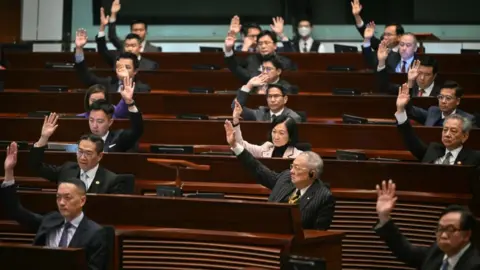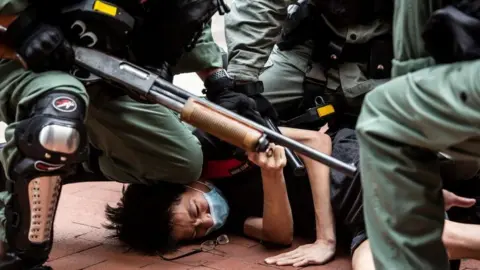HK security law is final nail in coffin, say critics
 Getty Images
Getty ImagesWestern leaders, the UN and rights groups have joined a chorus of criticism of Hong Kong's new security law, saying it further erodes freedoms.
Article 23, as it's known locally, was unanimously passed by the city's pro-Beijing parliament, targeting a range of offences deemed treasonous.
Officials say the law is essential for stability but opponents called it a "nail in the city's coffin".
China has long pushed for the law and said "smears" by critics would fail.
The new law allows for closed-door trials, gives the police rights to detain suspects for up to 16 days without charge and penalties including life sentences, among other things.
"The new national security legislation is going to double down the repression on freedoms in Hong Kong with extended egregious sentences and a broadened definition of national security," said Frances Hui, an activist now based in the US, who described the legislation as a "final nail in a closed coffin".
A group of 81 lawmakers and public figures from across the world, including in the UK, US, Canada and South Korea, issued a joint statement on Tuesday expressing "grave concerns" over the legislation, which expands on the National Security Law imposed by Beijing in 2020, and criminalises secession, subversion, terrorism and collusion with foreign forces.
"The legislation undermines due process and fair trial rights and violates Hong Kong's obligations under international human rights law, jeopardising Hong Kong's role as an open international city," the statement said, calling it yet another "devastating blow" for freedom.
The US said it was "alarmed" by the "sweeping and... vaguely-defined" provisions in the legislation, a concern echoed by the EU, which said the law could affect the city's status as a business centre.
Meanwhile, the UK's Foreign Secretary David Cameron said the law would "further damage rights and freedoms" and "entrench a culture of self-censorship" in the former British colony. Hongkongers have told the BBC how they are already being careful with what they say to friends and colleagues, fearing an "informant culture" has developed in the city.
Lord Cameron's comments sparked a strong response from the Chinese Embassy in the UK, which rubbished his remarks as "a serious distortion of the facts".
China's government also hit back at the criticisms of Article 23, saying it is "unswervingly determined to safeguard national sovereignty, security and development interests, implement the 'one country, two systems' policy, and oppose any external interference in Hong Kong affairs".
"All attacks and smears will never succeed and are doomed to fail," foreign ministry spokesman Lin Jian told a regular press conference in Beijing.
 Getty Images
Getty ImagesHong Kong's leader John Lee had earlier also defended the law - which was fast-tracked through its final phase on Tuesday - saying the legislation would help the city "effectively prevent, suppress and punish espionage activities, conspiracies and traps from foreign intelligence agencies, and infiltration and sabotage by hostile forces".
"From now on, the people of Hong Kong will no longer experience these harms and sorrows," he added.
But those who led the pro-democracy protests against China's increasing influence on the city see the new law as yet another lost battle.
It brings Hong Kong "one step closer to the system of mainland China", former Hong Kong lawmaker Nathan Law, who is now in exile in the UK, told the BBC's Newsday programme.
"The chilling effect... and the result of a collapse of civil society is impacting most Hong Kong people."
Ms Hui, who is now Policy and Advocacy Coordinator at the Committee for Freedom in Hong Kong Foundation, said she is also concerned the law could also be used to target HongKongers overseas, or their families and friends back home. The city has previously offered bounties for information on activists who fled overseas, and arrested four people in Hong Kong for supporting people abroad who "endanger national security".
Ms Hui left Hong Kong in 2020 after Beijing imposed the NSL that has since seen more than 260 people arrested. It was introduced in response to massive pro-democracy protests which engulfed the city in 2019.
She said civil liberties in Hong Kong are "long gone" four years after the NSL took effect.
Chris Patten, Hong Kong's last British governor, described the legislation as "another large nail in the coffin of human rights and the rule of law in Hong Kong and a further disgraceful breach of the Joint Declaration".
Hong Kong was handed back by the UK to China in 1997 under the principle of "one country, two systems", which guaranteed the city a certain degree of autonomy. While Beijing and Hong Kong both insist this is still the case, critics and international rights groups say China's grip on the city has only tightened with time.
